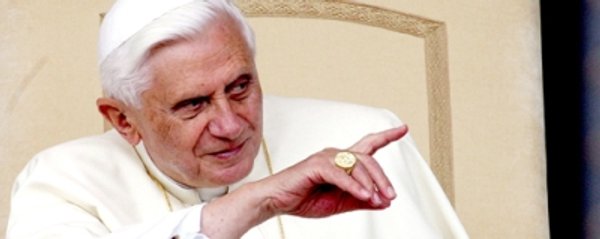Salvation is offered to us, the Pope says, "in the sense that we have been given hope, trustworthy hope, by virtue of which we can face our present: the present, even if it is arduous, can be lived and accepted if it leads towards a goal, if we can be sure of this goal, and if it is great enough to justify the effort of the journey."
Christians "have a future: it is not that they know the details of what awaits them, but they know in general terms that their life will not end in emptiness…The Gospel is not merely a communication of things that can be known; it makes things happen and is life-changing. The dark door of time, of the future, has been thrown open. The one who has hope lives differently; the one who hopes has been granted the gift of a new life."
"To come to know God, the true God, means to receive hope," the Holy Father says. The Ephesians understood this very well. Although they had worshiped many gods, before they met the true God they were "without hope and without God in the world." "We who have always lived with the Christian concept of God, and have grown accustomed to it, have almost ceased to notice that we possess the hope that comes from a real encounter with this God."
The Holy Father reminds us that Jesus did not bring "a message of social revolution" like Spartacus, "nor was he engaged in a fight for political liberation like Barabbas or Bar-Kochba." What Jesus brought was "something totally different: an encounter with the Lord of all lords, an encounter with the living God and thus an encounter with a hope stronger than the sufferings of slavery, a hope that transforms life and the world from within…even if external structures remain unchanged."
Christ has made us truly free: "We are not slaves of the universe…of the laws of material causality." We are free because "heaven is not empty," because God is the Lord of the universe, who "in Jesus has revealed himself as Love."

After explaining the relationship between hope and faith, the Pope remarks that "many people reject the faith today simply because they do not find the prospect of eternal life attractive…The present crisis of faith," he continues, "is essentially a crisis of Christian hope." "The restoration of the lost ‘Paradise’ is no longer expected from faith," but from technical and scientific progress, which will give rise to "the kingdom of man." Hope is thus transformed into "faith in progress." "Two categories become increasingly central to the idea of progress: reason and freedom, which seem to guarantee by themselves, by virtue of their intrinsic goodness, a new and perfect human community."
Following Pope Benedict’s survey of the false promises of modern scientific, philosophical, and political thought, we can "say quite simply: man needs God; otherwise he remains without hope." "Man can never be redeemed simply from outside…. man is redeemed by love," an unconditional, absolute love: "Man’s great, true hope that holds firm in spite of all disappointments can only be God—God who has loved us and who continues to love us ‘to the end,’ until all ‘is accomplished.’ "
The Pope goes on to point out four "settings in which we can learn about hope and practice it." The first is prayer: "When no one listens to me any more, God still listens to me. When there is no longer anyone to help me, he can help me."
Along with prayer, deeds of service to others: "Hope in a Christian sense is always hope for others as well. It is an active hope in which we struggle…towards a brighter and more humane world." Only if I know "that my own life and history in general are held firm by the indestructible power of Love" can I hope.

Suffering is another setting in which we learn how to hope. "Certainly we must do whatever we can to reduce suffering." But "it is not by fleeing from suffering that we are healed; it is rather by our capacity for accepting it, maturing through it and finding meaning through union with Christ, who suffered with infinite love." We also need to suffer with others and for others. "It is a cruel and inhuman society that cannot accept those who suffer."
Finally, a fourth setting is the Judgment of God. "There is a resurrection of the flesh. There is justice. There is an ‘undoing’ of past suffering, a reparation that sets things right." The Pope is "convinced that the question of justice constitutes the essential argument, or in any case the strongest argument, in favor of faith in eternal life." It is impossible that the "injustice of history should be the final word." In God’s justice there is also grace. However, "grace does not cancel out justice…Evildoers, in the end, do not sit without distinction beside their victims at the table of the eternal banquet, as though nothing had happened."
The encyclical’s eight sections are entitled "Faith is Hope," "The concept of faith-based hope in the New Testament and the early Church," "Eternal life—what is it?," "Is Christian hope individualistic?," "The transformation of Christian faith-hope in the modern age," "The true shape of Christian hope," " ‘Settings’ for learning and practicing hope": 1) Prayer as a school of hope; 2) Action and suffering as settings for learning hope; 3) Judgment as a setting for learning and practicing hope," "Mary, Star of Hope." The final section is a long prayer to our Lady, invoking her intercession.
